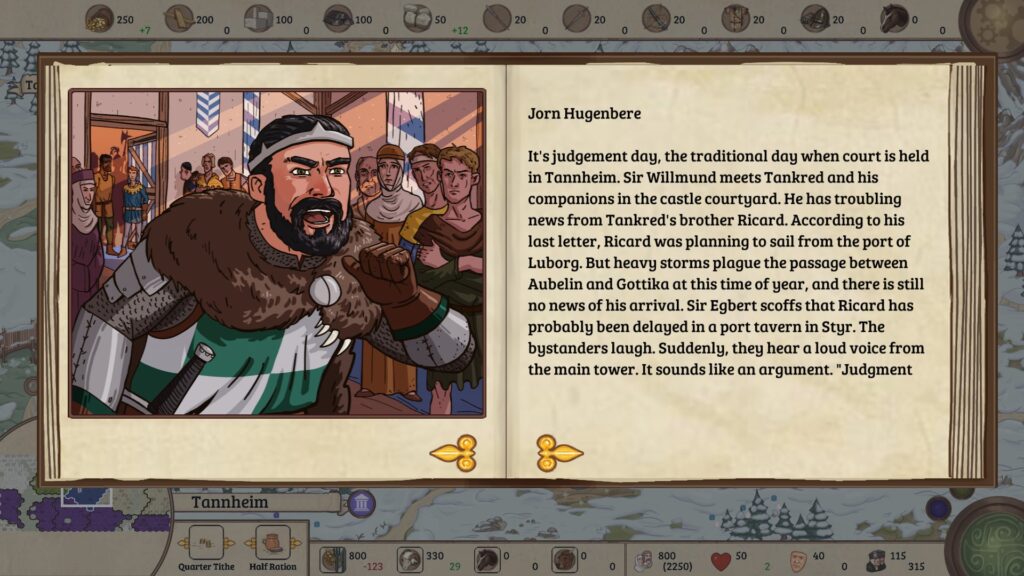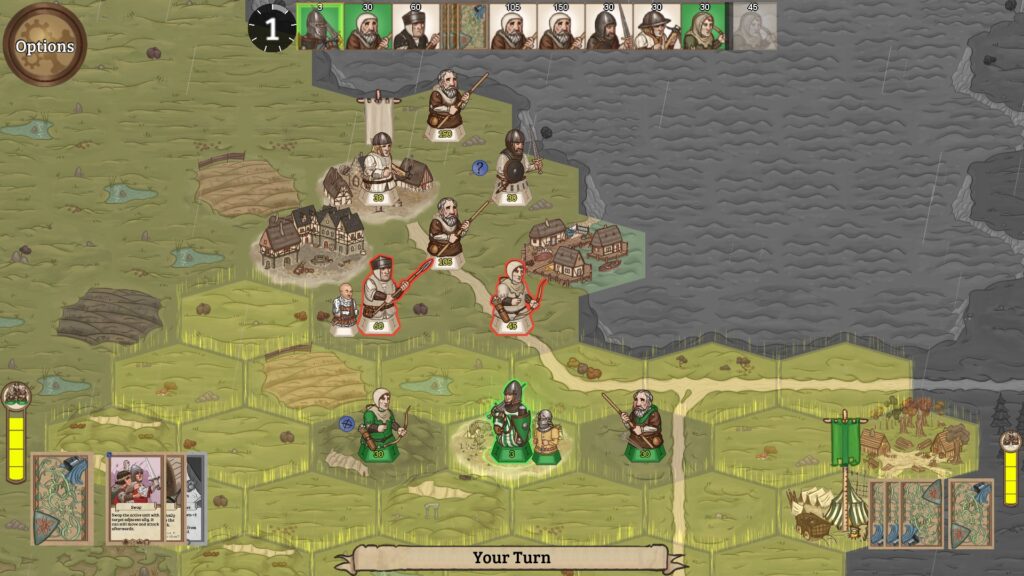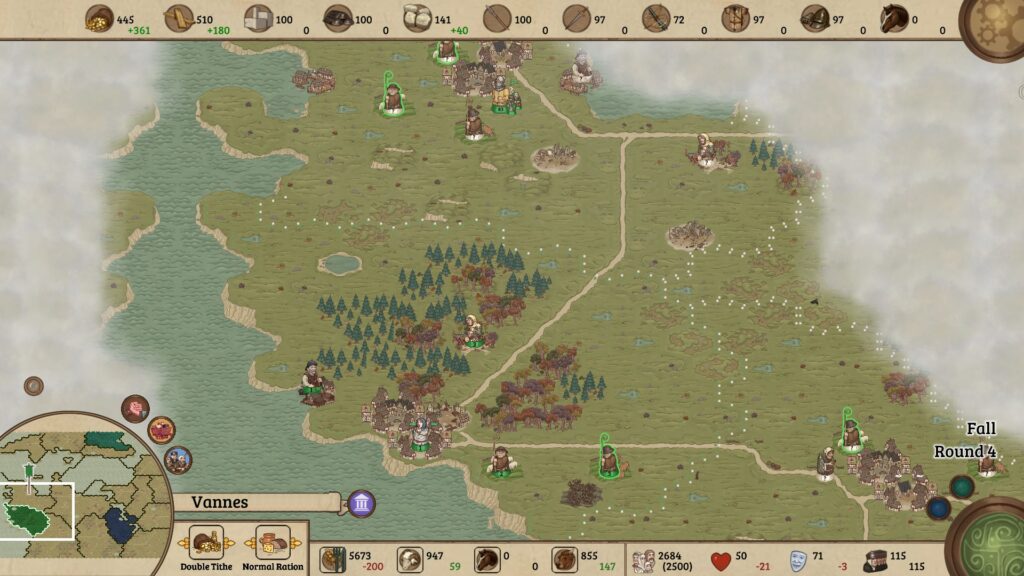
Developer: Argonwood
Publisher: Deck13, WhisperGames
Platform: PC, Xbox One, Xbox Series X|S, Switch
Tested on: PC
Rising Lords – Review
After a whopping five years in Early Access, developer Argonwood’s medieval strategy title Rising Lords is finally available in its full-fledged version, for PC and console gamers alike. Being fans of both turn-based strategy games and management sims, we’ve had our eyes on the game for a while. We’ve even previewed one of the Early Access builds in 2020 on this very site. Over three years have passed since, so we were more than eager to return to Rising Lords and deliver our final verdict.
Story
An opening cutscene details the events prior to Rising Lords’ story campaign. The game is set in Aubelin, a proud kingdom on an island in the Iron Sea. Aubelin was a prosperous nation, ruled by a benevolent king. However, as the king grew older, lunacy awoke inside him, and he dragged the kingdom down with him in his insanity. The king’s only daughter stood up and led a rebellion against her father, becoming the people’s champion. After a long and brutal war, she succeeds in overthrowing the mad king, banishing him to the mines. In the wake of the conflict, Aubelin has become a scorched land, however. The nation is torn into small pockets, with various lords vying for control. It’s in the aftermath of the chaos of war that Rising Lords starts. The remainder of the story is told purely in text form, presented as historical books. It fleshes out the events of Aubelin’s story for those interested, but it’s just as easy to ignore or skip this if you simply care about the gameplay.
Graphics
Taking inspiration from illustrations seen in actual medieval literature, Rising Lords boasts a striking art style. Not only does this fit the game’s setting, but the game is easy to read at a glance, and there is no need to dig deep into menus to find the information that you are looking for. The board game aesthetic with hexagon tiles and cards meshes well with the hand-drawn art style, and although the animations are very simple, there is enough movement on-screen to make the overworld feel alive.
Sound
If there is one area where we feel Rising Lords drops the ball, it’s with its audio. Apart from the opening cutscene, which is narrated, the game lacks voice acting. The soundtrack could have had more variety, and the sound effects are so-so. The silver lining is that you’re not missing out on much if you’re playing the game in multiplayer and are talking to other players through your headset, but for the single-player modes in particular, this feels like a missed opportunity.
Gameplay
Equal parts management sim and turn-based strategy game, Rising Lords offers a solid take on both of the genres it encompasses. The game follows a board-game-like structure, split into turns, each encompassing a season. Players perform a number of actions before ending the turn and seeing the consequences of their decisions play out. The in-game economic system is built around the cornerstone of medieval Europe: the peasant. At the start of a turn, peasants are generated at the center of your town. They can then be picked up and allocated to hexes that generate resources, like fields or woods, or they can be assigned different tasks, such as helping with the development of towns. Apart from assigning tasks to peasants, you’ll also need to keep an eye on morale, rations, and taxes. Providing much food keeps peasants happy but dwindles your resources, while raising too many taxes might mean you have plenty of gold to spend in the short run, but it will also decrease the productivity of your peasants as they become unhappy.
In theory, you have all the building blocks to be a benevolent lord and set up a bustling city, provided you are able to generate the necessary resources and materials to keep your income steady and your population happy. A happy peasant is a productive peasant after all! However, random events can disrupt the careful balance, and you’ll need to prepare for this adequately. A particularly harsh winter can ruin your crops or the sudden appearance of a bear can diminish your population of workers. You’ll need to strategize and prepare for every possibility.
Some of those possibilities involve military action, of course, which is where Rising Lords’ combat mechanics come into play. During the economic phase, you are able to build up your army and move them to a nearby hex, to invade enemy territory, or to respond to enemies attacking yours. After ending your turn and resolving decisions, combat is initiated. You can choose to have the game resolve conflict automatically, which is a timesaver if you have a very powerful army, or fight manually. If you opt for the latter, the game shifts to a battlefield where you face off against enemy forces in turn-based battles. Turn order is determined by unit speed, and terrain and unit weaknesses play a part too. Archers are more effective when stationed on a hill, for example, and spearmen are effective against knights. Rising Lords’ core combat mechanics aren’t anything new, although the flow of battle can be influenced by cards that apply effects to your units.
If the above sounds daunting, rest assured that Rising Lords is a very intuitive game in practice. The mandatory tutorial does a good job of covering the game’s mechanics, and once you’re familiar with these, you can start strategizing to your heart’s content. Rising Lords is one of those games that nails the ‘easy to learn but hard to master’ formula. Just when we thought that the game was perhaps too simple, and even shallow, the lengthy story campaign threw us a few curve balls, opening up new strategic layers in the process. Granted, there are some balance issues, and we ran into the occasional difficulty spike in the campaign.
Supplementing the lengthy story campaign are standalone skirmish scenarios, a challenge mode, and multiplayer so that you can test your mettle against up to three other aspiring lords. Additionally, you can customize levels, allowing you to create your own scenarios and share them with the community. This bodes well for the longevity of the game and we can see Rising Lords build a dedicated community over time. It all adds up to a game that might not be the most innovative take on either turn-based strategy games or management sims, but the end result is something that is capable of pleasing fans of both genres.
Conclusion
Mashing two genres together doesn’t always pay off, but in the case of Rising Lords, the end result is successful. The game provides a solid take on both genres, even if it doesn’t bring anything particularly revolutionary to the table. The occasional difficulty spike in the story campaign and the underwhelming sound design are minor blips in the grand scheme of things. Rising Lords has the potential to become a bona fide classic, thanks to its high degree of accessibility and replay value. Multiplayer mode and custom scenarios in particular provide plenty of reasons to keep returning to the game, with the core gameplay formula doing exactly what it needs to do.










No Comments